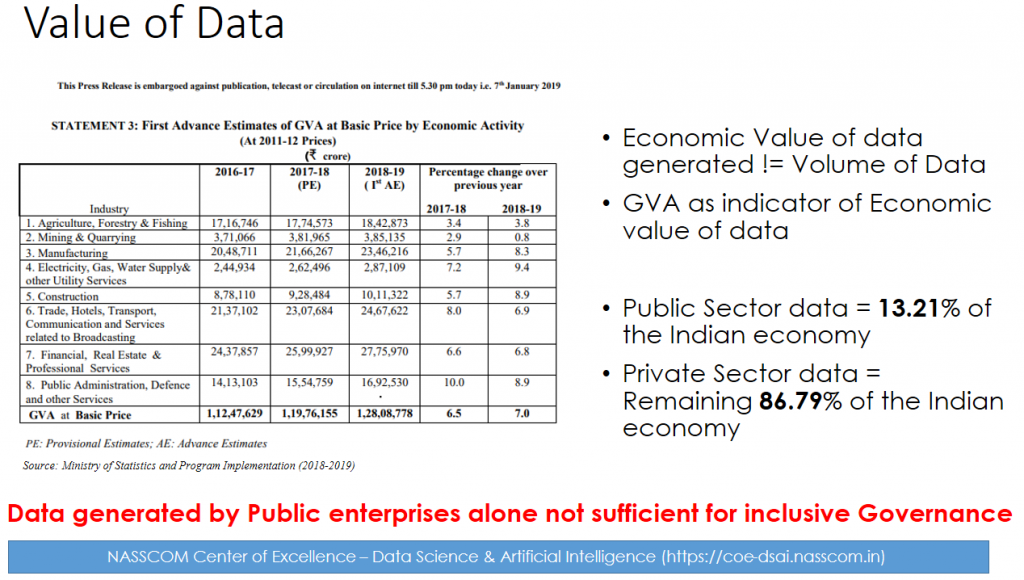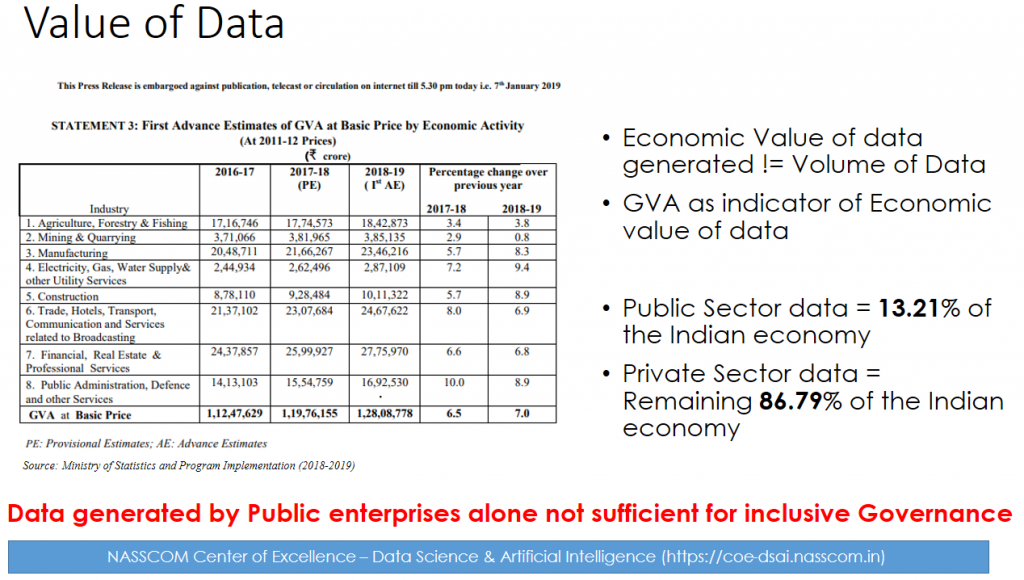Democratising data in India
Blog: NASSCOM Official Blog
Since Bharath shifted to a Global economic model in early 1990s, she had been opening more and more of her public sector to private participation. Consequently, there is also the shift of data to the private sector even when these services are utilising National public resources like Radio spectrum for telecommunication etc.
The value of data thus generated in Gross value added (GVA) terms for Bharath are as follows:

To have a fuller appreciation of the performance of the overall economy, it is imperative to have a clear view of data generated by both Public and Private sectors.
In that context, the benefits of Open data are numerous:
- First, Governance of Public service delivery will see a sea change. The ability to measure performance is the most fundamental need which leads to analysis and improvement of the same.
- Enhances service delivery of private providers catering to public in areas like Agriculture, Healthcare, Logistics, Transportation, Housing, Utility and the list is endless.
- Advanced next generation sectors like Data Science and Artificial intelligence need data to develop their models to be deployed in their Products and services.
Digital payments in India saw a 3-fold increase from 1,013 crores in FY2016-17 to 3,133 crores in FY2019-20 thanks to the side effects of Demonetisation in 2016, several Retail vendors have also adopted digital payments.

So, there is a need to:
1. Ensure that the data generated in these sectors remain owned by public institutions.
2. Due to the sensitivity around the same, it also requires building enough safeguards around access and usage of Public data in critical sectors.
The challenge is how do we open and leverage the data for development, rather than our policies around data becoming impediments?
While the Gol is instrumental in setting Policy guidelines for Non-personal data and Personal data, it is important for us to commence realizing the value of data before it becomes stale (data have expiry dates too). To that end, it requires robust implementation and rollout of platforms that enable tangible and seamless access to data.
Some notable GoI policy guidelines and Open data platforms form the recent past are:
- National Data Sharing and Accessibility Policy (NDSAP) released on 9 February 2012 by GoI with the objective of facilitating access to Government of India (GoI) owned shareable data and information in both human readable and machine-readable forms.
- Quoting from the Data protection in India report by our “Digital India initiative”. “The reality of the digital environment today, is that almost every single activity undertaken by an individual involves some sort of data transaction or the other”.
Source: https://digitalindia.gov.in/writereaddata/files/6.Data%20Protection%20in%20India.pdf
Open data repositories like https://data.gov.in are the outcome of these initiatives.
Researches and Academicians have also contributed to open repositories like this one for NLP for Indian languages https://github.com/ai4bharat-indicnlp/indicnlp_corpus
Challenges:
- Policy, Process guidelines by GoI covers the overarching tenets of Data Governance, but the real value in leveraging our data assets is in translating Policy into effective systems that enable seamless contribution and consumption of data.
- Develop and implement Systems of classification for data.
Krishna Prabhu
Technical Director
NASSCOM CoE DS&AI
The post Democratising data in India appeared first on NASSCOM Community |The Official Community of Indian IT Industry.
Leave a Comment
You must be logged in to post a comment.








